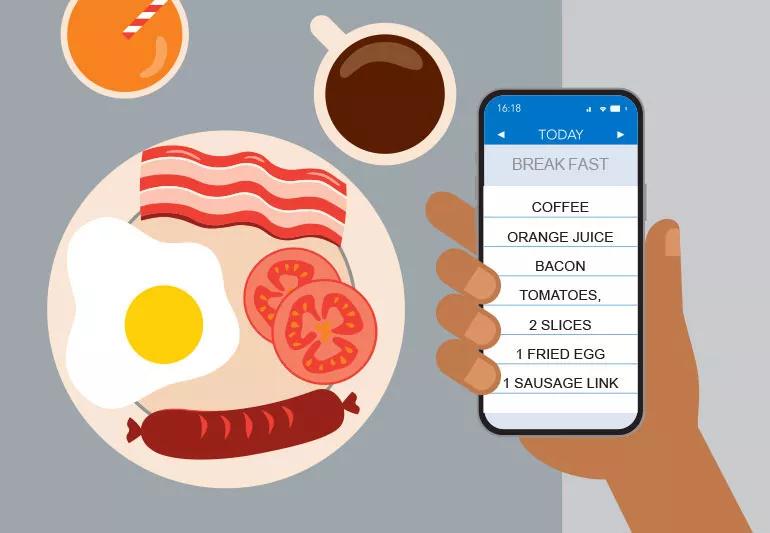Keeping a food journal can help with more than just losing weight

What did you have to eat for breakfast yesterday? And what about the day before that — did you have one or two eggs, a bowl of cereal or just a single cup of coffee? And if you had coffee, how much cream or sugar did you use?
Advertisement
Cleveland Clinic is a non-profit academic medical center. Advertising on our site helps support our mission. We do not endorse non-Cleveland Clinic products or services. Policy
Hashing out all the details of your past meals certainly sounds exhausting, especially if you haven’t been keeping track of everything you’ve been eating along the way. But keeping a food journal makes tracking what you eat easier. Plus, it’s also a way of identifying the habits and patterns you’ve developed in relation to the food you’re eating.
Registered dietitian Devon Peart, RD, MHSc, BASc, explains how keeping a food journal can help beyond weight management, and shares tips and tricks for getting started.
In general, a food journal is a living document that you use to keep track of everything you eat and drink — and that includes snacks, candy, coffee and anything else you have for and between meals.
“The more detail you include, the more useful your food journal will be” says Peart. “And you can make it as specific or as general as you like.”
That means you can count calories if that method works for you, but you don’t have to be that detailed. Instead, you can simply choose to keep a record of everything you eat and drink, the time of day and how much you’ve had (is it a fist-size of rice or two fists?).
“From a weight management perspective, there is good evidence that keeping a food journal can be really helpful, but that’s not the only benefit of keeping a food journal,” she notes.
Advertisement
A food journal can help in three significant ways:
“What the food journal includes is really dependent on what you’re using it for,” says Peart. “With food, we often have a hard time remembering what we ate and how much because it’s something we do so often. The first step to changing and building better habits is to be aware of your existing habits.”
Learning what you eat and how much you eat can be just as enlightening as learning how often you eat and what inspires you to eat.
Are you eating because you’re hungry or are you stress eating? If you’re trying to manage emotional eating, keeping a log of how you feel when you’re hungry, how you feel when you eat certain foods and how you feel after eating can help you identify patterns and behaviors you’re trying to improve.
“A food journal helps us see the connection between what we’re eating and how we’re feeling, how we’re sleeping, how we’re performing when we exercise or our ability to concentrate at work,” explains Peart. “If we’re not keeping track, we don’t necessarily make that connection.”
That’s especially true for anyone with health or digestive conditions like:
“Keeping a food journal helps you connect foods to symptoms,” she adds.
If you need to keep track of trigger foods because you have IBS, diverticulitis or a food sensitivity to ingredients like gluten or lactose, you might keep track of additional details that include:
“Keeping a food journal doesn’t have to be cumbersome or take a lot of time,” says Peart. “You can use a simple number scale to rate the severity of symptoms, or you can use emojis like a smiley face, neutral face or sad face to track how you’re feeling.”
Food elimination diets like the AIP diet can also benefit from this approach to food journaling because it helps you be more aware of how your body reacts to each individual food, whether it’s in its raw form or prepared some other way.
Peart says anyone can benefit from keeping a food journal. “But,” she cautions, “if it adds to stress, then try making it more general. For example, start by simply noting your feelings.
Advertisement
“If you have an eating disorder, or a history of disordered eating, I don’t recommend tracking amounts and calories because too much focus on food and numbers and amounts can trigger disordered eating and potentially cause a relapse,” she continues. “But journaling about your thoughts and feelings is always a good idea.”
If you’re coordinating with a dietitian, it’s useful to share your food journal with them to talk about what’s working and what’s not.
“If you’re working with a therapist about stress and emotional eating, a food journal can help with that process as well,” says Peart. “If your doctor is monitoring a health condition, it can be helpful to keep track of your symptoms and what you’re eating in that situation, too.”
If keeping a food journal is something you’re interested in, here are a few helpful tips to get you started:
Food journaling is a marathon, not a sprint. In the beginning, give yourself some grace and try to record what you’re consuming one meal at a time. You don’t have to have exact measurements, either.
“At the end of the week, you can look back and start to see patterns that you might not have been aware of until you wrote them down,” says Peart. “Keeping a food journal doesn’t have to happen every day forever and ever. If you feel like you’re getting a little bit off track or you feel like you’re slipping into old habits or your weight is starting to slowly creep up over the course of a few weeks, keeping a food journal might be a good idea.”
Advertisement
If you’re going to keep a food journal, try to keep track of your foods as you’re eating them or right after you eat. That way, you don’t put it off or forget what you ate hours later.
“If you don’t have a lot of time and you’re out to eat, take a quick picture and then write it down later,” suggests Peart. “Make sure you also keep track of what you eat on the weekends because many of us eat very differently on the weekends than we do during the week.”
If something doesn’t work, try a different approach. If you don’t find counting calories beneficial, try listing foods and drinks instead. If you don’t like physically writing out every detail, keep a tally of what you like on a scale from 1 to 10.
“I would always start by asking yourself, ‘What is my purpose for keeping a food journal? What do I hope to learn?’ Start there, then design your journaling around that goal,” recommends Peart.
You can go the pen-to-paper route, but there are also a lot of apps that sync with smart watches, phones, fitness trackers and other devices that can keep track of things for you in simple and easy ways. Whichever route you choose to food journaling, it’s important that you pick an option that works specifically for you and your goals — even if your only goal is to be more mindful of your diet and nutrition.
Advertisement
“Sometimes, keeping a food journal is simply about improving your education and your own knowledge about what you’re consuming,” encourages Peart.
Learn more about our editorial process.
Advertisement

With a focus on internal cues for hunger and fullness, this eating style may revolutionize your relationship with food

Review the ingredients, watch for sugar and fat, and choose one with the right amount of protein for your needs

Getting the hang of portions can help you better understand how much to put on your plate

A typical recommended balanced diet is half fruits and veggies, a quarter protein and a quarter grains

Foods high in protein, fiber and water can help keep hunger at bay

This quirky food trend is harmless, as long as you’re getting enough protein, fiber and healthy fats

Learning about your relationship with food can help improve your eating behaviors and patterns

Eating mindfully, sipping water and chewing slowly can help your brain catch up with your stomach

Wearing a scarf, adjusting your outdoor activities and following your asthma treatment plan can help limit breathing problems

Your diet in the weeks, days and hours ahead of your race can power you to the finish line

When someone guilt trips you, they’re using emotionally manipulative behavior to try to get you to act a certain way